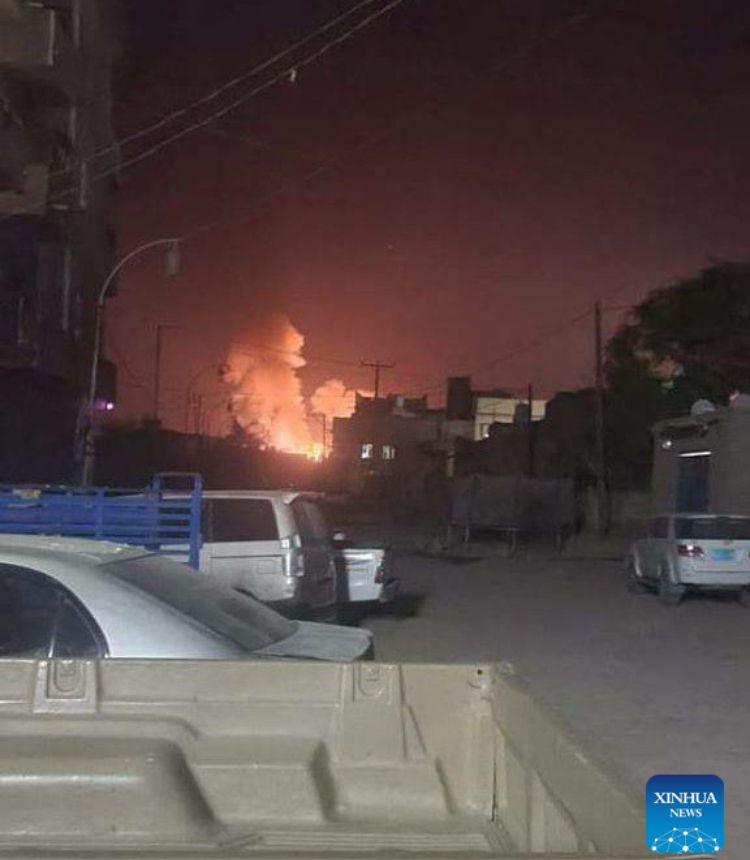
Fire is seen after an airstrike launched by the US and Britain near Sanaa in Yemen, January 12, 2024. Photo: Xinhua
The situation in the Red Sea may become even more complicated if Yemen's Houthi rebels engage in a conflict with the US and its allies. Analysts noted that this could lead to further spillover beyond the crisis in the sea, especially considering the absence of a political solution to the Palestinian-Israeli conflict and they also urged the US to stop using military measures and go back to the path of seeking a political solution.
After the US and the UK launched strikes from the air and sea against Houthi military targets in Yemen on Thursday, Houthi Deputy Foreign Minister Hussein Al-Ezzi said in a post on X that the attackers were going to pay a heavy price.
The US and UK military forces have completed targeted strikes in Yemen, hoping to stop Houthi attacks on ships in the Red Sea. More than 100 precision missiles were reportedly used in striking over 60 targets at 16 locations, including command and control nodes, munitions depots, launching systems, production facilities, and air defense radar systems. Fighter jets, navy destroyers, a submarine and Tomahawk cruise missiles were all used in the blitz. The intended targets were hit, officials claimed, according to media reports.
The escalation of the crisis in the Red Sea has concerned the international community. The United Nations Security Council (UNSC) on Wednesday approved a resolution calling on Yemen's Houthi rebel group to "cease its brazen" attacks in the Red Sea. Analysts said the UNSC resolution should not be seen as a green light for the US military action in the region, and nor should it be misused to create a new strained situation.
China is concerned over the escalating tension in the Red Sea and calls on all relevant parties to remain calm and exercise restraint, in order to avoid further escalation of conflict, Chinese Foreign Ministry spokesperson Mao Ning said at a press conference on Friday.
Mao noted that the Red Sea area is an important international trade route for goods and energy, and that all parties involved can play a constructive and responsible role in maintaining the security and stability of the Red Sea, which is in line with the common interests of the international community.
Zhang Xuefeng, a Chinese military expert, told the Global Times that the US and UK's strike serves as a warning to the Houthi rebels, but its deterrent effect may be limited.
The crisis in the Red Sea is a consequence of the ongoing Palestinian-Israeli conflict. Following the Thursday strike, the US and its allies may consider intensifying their attacks against the Houthi rebels. However, this could lead to more retaliatory strikes from the Houthi rebels, potentially targeting US military bases in the Middle East. Such escalation could expand the conflict and draw the US deeper into the regional turmoil, said Zhang.
Previously, the US had been reluctant to expand its strikes on the Houthi militia, as it is primarily focused on competition with other major countries. Moreover, with the US entering an election cycle, an expansion of the war in the Middle East could introduce more uncertainties into the election, analysts said.
The Houthi militia will not stop retaliating against the US and UK, and both sides will be engaged in continued and possibly escalated mutual attacks. Once significant casualties occur, the conflict will become even more tense, and the Red Sea will be at a more complex crossroads, Ding Long, a professor with the Middle East Studies Institute of Shanghai International Studies University, told the Global Times.
The Palestinian-Israeli conflict is also the catalyst for the Houthi's attacks on commercial ships, and resolving the Red Sea crisis depends on a cease-fire between Israel and Palestine. However, the US deliberately conceals the connection between the Red Sea crisis and the Palestinian-Israeli conflict, attempting to portray them as isolated events and only emphasizing the illegality and harm caused by the Houthis, said Ding.
Ding said that whether it is the Palestinian-Israeli issue, the Yemen issue, or the Red Sea issue, facts have proven that military means cannot solve these problems and will only worsen the situation.
The US, the UK and other parties should recognize the urgency of the situation and return to the path of political resolution, and the international community should also form a consensus to jointly promote political solutions, said Ding.
